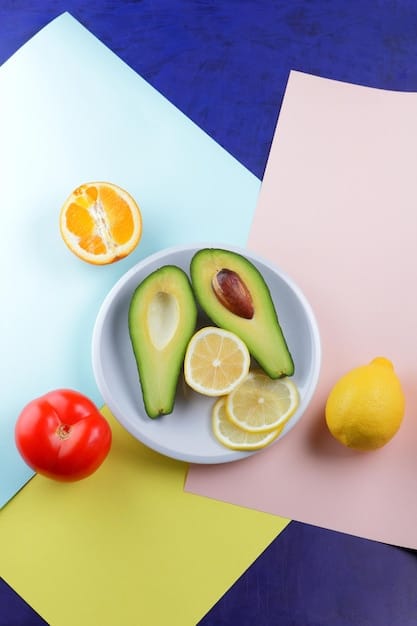The Impact of Diet on Skin Health: Clearer Skin in 30 Days

The impact of diet on skin health is significant, with certain foods promoting a clearer complexion and others contributing to breakouts and inflammation; adopting a balanced dietary approach can visibly improve skin within 30 days.
Want to achieve radiant and healthy skin? The secret might be in your fridge! Discover the impact of diet on skin health: foods to eat and avoid for a clearer complexion in 30 days.
Understanding the Diet-Skin Connection
The link between diet and skin health is becoming increasingly clear. What you eat directly affects your body’s overall health, and the skin, being the largest organ, is no exception. A balanced diet can provide the necessary nutrients to keep your skin healthy, hydrated, and radiant, while a poor diet can lead to inflammation, acne, and premature aging.
How Diet Impacts Skin Health
Diet plays a crucial role in maintaining skin health by providing essential nutrients like vitamins, minerals, and antioxidants. These nutrients help to protect the skin from damage, promote collagen production, and reduce inflammation. A consistent intake of these nutrients through a balanced diet can lead to visible improvements in skin texture, tone, and overall appearance.
Inflammation and its Effect on Skin
Inflammation is a key factor in many skin conditions, including acne, eczema, and psoriasis. A diet high in processed foods, sugar, and unhealthy fats can trigger inflammation in the body, leading to flare-ups and worsening of these skin conditions. Conversely, a diet rich in anti-inflammatory foods can help to reduce inflammation and improve skin health.

- Nutrient Absorption: Proper digestion and gut health are essential for nutrient absorption, which directly impacts skin health.
- Hormonal Balance: Diet can influence hormone levels, affecting sebum production and acne development.
- Antioxidant Protection: Antioxidants from foods protect the skin from free radical damage and premature aging.
In conclusion, understanding how diet influences skin health is the first step toward achieving a clearer complexion. By making informed food choices, you can nourish your skin from the inside out, promoting a healthy and radiant appearance.
Foods That Promote Clear Skin
Certain foods are rich in nutrients that support skin health and can help to improve your complexion. Incorporating these foods into your diet can provide the building blocks your skin needs to stay healthy and radiant. From antioxidant-rich fruits to hydrating vegetables, there’s a wide array of options to choose from.
Fruits for Glowing Skin
Fruits are packed with vitamins, minerals, and antioxidants that are essential for skin health. Berries, in particular, are high in antioxidants, which help protect the skin from damage caused by free radicals. Vitamin C, found in citrus fruits and strawberries, is crucial for collagen production, which helps maintain skin elasticity and firmness.
Vegetables for Healthy Skin
Vegetables are an excellent source of vitamins and minerals that contribute to skin health. Leafy greens like spinach and kale are rich in vitamins A and C, as well as antioxidants. Carrots are high in beta-carotene, which the body converts into vitamin A, an important nutrient for cell growth and skin health. Incorporating a variety of vegetables into your diet ensures that you’re getting a wide range of nutrients beneficial for your skin.
- Avocados: Healthy fats and vitamin E help keep skin moisturized and supple.
- Sweet Potatoes: Beta-carotene converts to vitamin A, promoting healthy skin cell turnover.
- Bell Peppers: High in vitamin C, which supports collagen production.
In summary, incorporating a variety of fruits and vegetables into your diet is a simple yet effective way to promote clear and healthy skin. These nutrient-rich foods provide the essential vitamins, minerals, and antioxidants needed to protect and nourish your skin from the inside out.
Foods to Avoid for a Clearer Complexion
While some foods are beneficial for skin health, others can have a negative impact. Avoiding certain foods can help to reduce inflammation, prevent breakouts, and improve overall skin health. Identifying these trigger foods is an important step toward achieving a clearer complexion.
Sugary Foods and Skincare
Sugary foods can wreak havoc on your skin. High sugar intake can lead to inflammation and increase the risk of acne. Sugar can also contribute to glycation, a process that damages collagen and elastin, leading to premature aging. Minimizing your intake of sugary foods and drinks can significantly improve your skin’s appearance.
Processed Foods and Their Affects
Processed foods are often high in unhealthy fats, sugar, and sodium, which can all contribute to inflammation and skin problems. These foods lack the essential nutrients your skin needs to stay healthy and can disrupt gut health, further impacting your skin. Choosing whole, unprocessed foods over processed options can help to improve your skin’s condition.

- Dairy Products: May trigger acne in some individuals due to hormonal effects.
- Refined Carbohydrates: White bread and pasta can cause blood sugar spikes, leading to inflammation.
- Fried Foods: High in unhealthy fats that can contribute to skin problems.
In conclusion, avoiding or minimizing your intake of sugary and processed foods is crucial for achieving a clearer complexion. These foods can trigger inflammation and disrupt the balance of nutrients needed for healthy skin. By making healthier food choices, you can support your skin’s natural ability to heal and rejuvenate.
Creating a 30-Day Diet Plan for Clear Skin
Creating a 30-day diet plan can be a structured way to improve your skin health. This plan should focus on incorporating foods that promote clear skin while avoiding those that can trigger breakouts and inflammation. A well-designed plan can provide the necessary nutrients to nourish your skin and promote a healthy, radiant complexion.
Sample Meal Plan
A sample meal plan can serve as a template for your 30-day diet. Start with a breakfast of oatmeal with berries and nuts, followed by a lunch of grilled chicken salad with leafy greens and vegetables. For dinner, opt for baked salmon with steamed broccoli and quinoa. Snacks can include fruits, vegetables, and a handful of nuts. This balanced approach ensures you’re getting a variety of nutrients throughout the day.
Hydration’s Role
Hydration is just as important as the foods you eat. Water helps to keep your skin hydrated and flushes out toxins. Aim to drink at least eight glasses of water a day. Herbal teas and infused water can also contribute to your daily fluid intake. Proper hydration is essential for maintaining skin elasticity and preventing dryness.
Implementing a 30-day diet plan requires consistency and commitment. Stick to the plan as closely as possible while remaining flexible and listening to your body’s needs. Gradual changes are more sustainable than drastic ones. Over time, you’ll develop healthy eating habits that support long-term skin health.
Tracking Your Progress
Another important element of your 30-day journey to better skin is to track your progress. By actively tracking and taking note of any changes, you can fine-tune your diet to maximize your results.
The Importance of Taking Pictures
One of the easiest ways to track your progress is to take pictures of your skin regularly. Make sure you take pictures from the same angles and that your lightning is consistent so you can easily see any improvements in your skin.
Consider a Food Journal
You may also want to consider keeping a food journal. This can help you track what foods you are eating and how they are affecting your skin. If you notice any new blemishes or that certain foods seem to be affecting your skin, you can make a note of it in your journal.
Remember to adjust your diet as needed to get the best possible results for your skin. It is also important to remember that what works for someone else may not work for you. While adopting better eating habits is almost universally beneficial, the results can vary from person to person.
Additional Tips for Clearer Skin
In addition to diet, other lifestyle factors can impact skin health. Getting enough sleep, managing stress, and following a good skincare routine can complement your dietary efforts and improve your skin’s appearance. A holistic approach that addresses all aspects of your life can lead to the best results.
The Importance of Sleep
Sleep is essential for skin repair and regeneration. During sleep, your body produces collagen and repairs damaged cells. Lack of sleep can lead to inflammation, dark circles, and dull skin. Aim for seven to eight hours of quality sleep each night to support healthy skin.
Managing Stress
Stress can trigger inflammation and exacerbate skin conditions like acne and eczema. Find healthy ways to manage stress, such as exercise, meditation, or spending time in nature. Reducing stress can help to improve your skin’s condition and overall well-being.
- Regular Exercise: Improves circulation and helps to deliver nutrients to the skin.
- Proper Skincare Routine: Cleansing, exfoliating, and moisturizing can keep skin healthy and clear.
- Sun Protection: Protect your skin from sun damage by wearing sunscreen daily.
In conclusion, combining a healthy diet with good sleep, stress management, and proper skincare can help you achieve a clearer complexion. These lifestyle factors work synergistically to support skin health and promote a radiant appearance.
| Key Point | Brief Description |
|---|---|
| 🍎 Fruits & Skin | Antioxidants in fruits protect skin; Vitamin C boosts collagen. |
| 🥗 Veggies & Clarity | Leafy greens, carrots offer vitamins for cell health. |
| 🚫 Avoid Sugar | Limit sugar to reduce inflammation and aging. |
| 💧 Stay Hydrated | Drink water for elasticity and toxin removal. |
Frequently Asked Questions (FAQ)
What foods are best for reducing acne inflammation?
Foods rich in omega-3 fatty acids, such as salmon and flaxseeds, can help reduce inflammation related to acne. Antioxidant-rich foods like berries and leafy greens are also beneficial.
How long does it take to see dietary changes reflected in skin health?
While individual results vary, many people notice improvements in their skin within 30 days of making significant dietary changes. Consistency is key.
Can cutting out dairy really improve my skin?
For some, yes. Dairy can trigger acne in certain individuals due to hormonal effects. Eliminating or reducing dairy intake may lead to clearer skin.
What role does hydration play in skin appearance?
Hydration is crucial for maintaining skin elasticity and preventing dryness. Drinking enough water helps flush out toxins and keeps skin looking plump and healthy.
Are there any supplements that can help with skin health?
Supplements like omega-3 fatty acids, vitamin C, and collagen can support skin health. However, it’s best to consult with a healthcare professional before starting any new supplements.
Conclusion
Ultimately, it is clear that there is a strong correlation between diet and skin health. If you want clear and glowing skin, then you must make sure to follow a healthy diet that is full of foods that provide the minerals, vitamins and nutrients that your skin needs to remain healthy and blemish free. By avoiding excessive sugar, fried foods and unhealthy chemicals, and by focusing on healthy eating habits, you can easily attain a youthful glow.
Click to explore!





